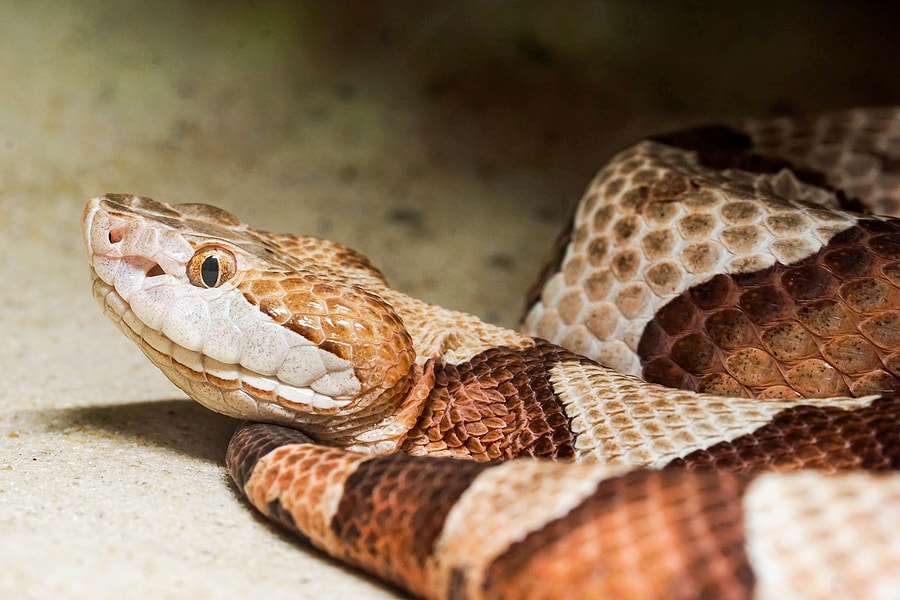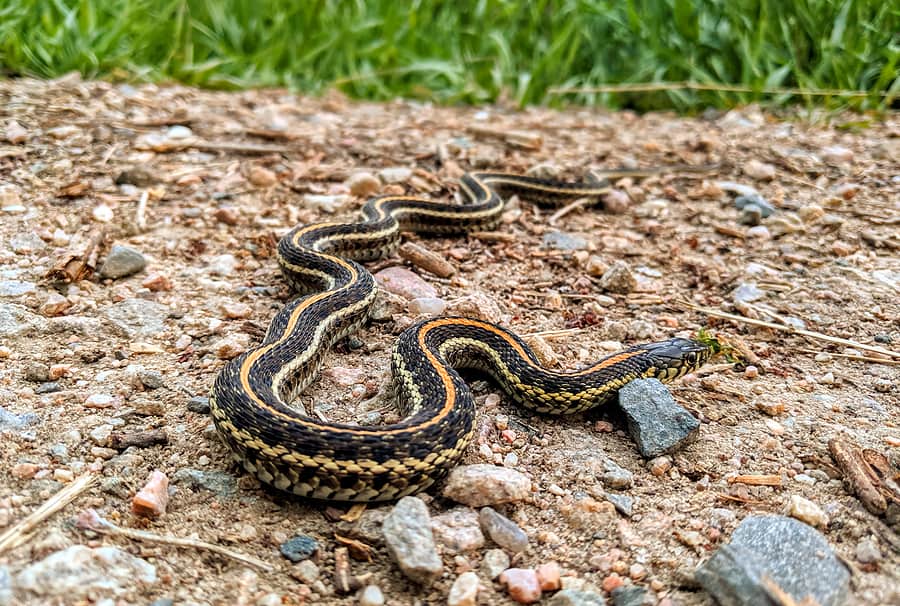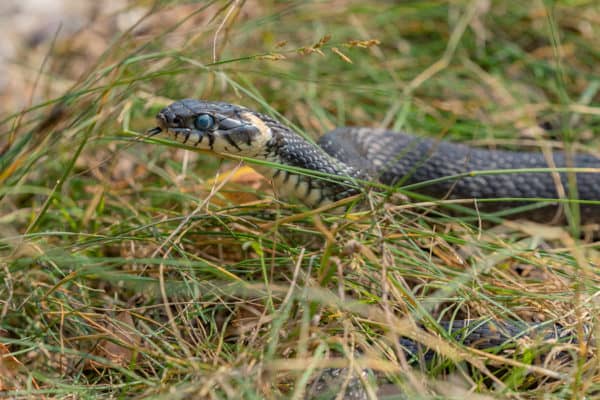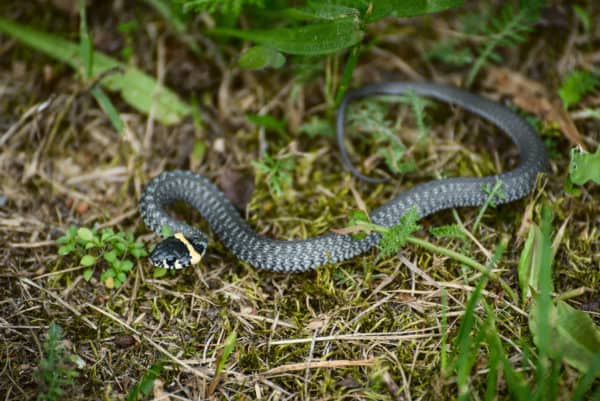READY TO GET STARTED?
REQUEST A FREE ESTIMATE
Fill out the form below or call (888) 466-7849 for a free, no-obligation estimate.

The last thing anyone wants to encounter when spending time outdoors is a snake. In Georgia, there are 46 native species of snakes and only 6 of those are venomous (the copperhead, pigmy rattlesnake, timber rattlesnake, cottonmouth, eastern diamondback rattlesnake, and eastern coral snake). Although they can be quite scary when stumbled upon, they are actually quite beneficial to have around. Snakes are top predators, eating rats, mice, and other small mammals. Some even eat other venomous snakes! There are only an average of 8000 snakebites nationwide each year.
Snakes are most commonly found in backyards, parks, and woodlands. Many species will spend most of their time underground, only coming out to hunt and feed. Larger snakes will often shelter in brush piles or stacks of firewood. Water snakes are usually found in areas that border streams, lakes, swamps, and ponds.
Snake season officially begins in the spring, usually around March or April, and runs through late fall and winter. The end of snake season depends on weather patterns and geographic locations. In southern states with warmer climates, snakes will remain active longer than in northern states when it gets colder sooner.
Because snakes are coldblooded, they are less active in cooler months. Where do snakes go in the winter? Many snakes will go into a state of brumation, which is similar to hibernation but doesn’t require the same amount of sleep. In brumation, snakes will wake to forage for food and water, especially during warm snaps when temperatures increase periodically. Because they use less energy, they can go longer between feedings.
If you encounter a snake, whether outdoors or inside your home, there are a few tips you should keep in mind:
Although snake bites are rare, it’s best to leave handling and removal of snakes to the professionals. If you encounter a snake in or near your property, contact a wildlife control company who can safely and quickly remove the offending snake.
Kudzu Bugs vs. Brown Marmorated Stink Bug: What’s the Difference?
How To Get Rid of Millipedes Naturally
What’s Attracting These Roaches?!

Snakes are one of the most feared pests homeowners can find in their yards. The likelihood of snakes coming onto your property depends on several factors like your location, surrounding landscape, nearby water source, available food supply, and your landscaping and maintenance. While the first instinct is usually to either run or get rid of it quickly, snakes can actually be pretty beneficial to have around. Instead of killing snakes, some people prefer to try and repel them to keep them from coming into the yard in the first place, or deter them from staying there if they’ve already taken up residence. There are several snake repellent products on the market, but do any of them really work? Here are some of the most common snake repellents, the reasons why you should avoid them, and some snake prevention tips you can use around your home.
Mothballs are one of the most popular snake repellent products. The active ingredient in mothballs is either naphthalene or paradichlorobenzene. Both of these products are known to be toxic to insects and mammals but are actually not effective on snakes (because they are actually reptiles). In fact, naphthalene has been proven to cause illness in humans (especially children) and pets. Additionally, using mothballs outside the home actually violates their product labels.
Sulfur is another common snake repellent ingredient and is often seen in many commercial snake repellent products on the market. Sulfur has been proven to not be effective against snakes, however, much the same as mothballs.
When snakes are terrorizing a chicken coop, many people will use ceramic or wooden eggs or even golf balls to trick snakes into eating them instead of real chicken eggs. The problem, however, is that when snakes eat these fake eggs they die a long, slow, painful death over the course of many weeks. Once they’re gone, another snake will often show up and take its place, defeating the purpose of eliminating the original snake. If you are using ceramic eggs to encourage your hens to lay, make sure to glue them down so snakes can’t eat them accidentally.
Many people will catch and release predatory snakes like king snakes and racers onto their property to hunt and kill the problematic snakes they have. This practice is usually unsuccessful and in some places is even against the law. The same goes for capturing the problematic snakes on your property and releasing them elsewhere.
Some people will lay out sticky traps in hopes of catching the nuisance snake so they can kill it or relocate it. The problem with this method is that the sticky traps will often catch non-targeted animals instead of the snake, resulting in a slow, agonizing death for the animal.
Many people employ guns or shovels to kill snakes that come onto their property. This puts people at great risk for injury either from the snake going on the defensive and biting its attacker or from the homeowner or innocent bystanders being injured by ricocheting bullets, etc. Once the snake is killed, it is often replaced by another snake that takes its place. A better deterrent for snakes is to spray them with a blast from the water hose. This encourages them to find a new location without harming them or anyone else.
Instead of using ineffective snake repellent products and methods, consider going to the source of the problem to help get rid of it. Snakes will come into your yard because they are attracted to something there – whether it is a water source, food source, or a place to shelter. Eliminating what attracts them will help keep them out and encourage them to find a different location to live in. Here are some snake prevention tips you can utilize to help make your yard less inviting to them.
The large majority of snakes you will encounter in your yard are harmless to humans. All snakes (even venomous snakes) are beneficial and play an important role in the ecosystem. Many snakes eat garden pests like slugs and snails, helping protect your plants and flowers. Some snakes eat rodents, helping control their populations and keeping them from spreading diseases to you, your family, your pets, and your livestock. There are even studies showing where rattlesnakes help keep Lyme disease in check. If you’ve tried the tips above and you still have an issue with snakes or any other pests, contact your local pest control company for a comprehensive evaluation and treatment plan.
The Traveler’s Guide to Bed Bugs
Take the Homework, Leave the Lice

If you live in an area where snakes are common, chances are you may stumble across one at some point. Snakes, like any other pest, are usually in search of three things: food, water, and shelter. Oftentimes the area around our homes provides all of these things that attract snakes.
The likelihood of a snake on your property depends on several factors, including location (north vs south), landscape (urban vs rural), a nearby water source (pond, lake, river), how well your lawn is landscaped and maintained, and how readily a food supply is available.
When dealing with snakes, it is important to identify the type of snake you are dealing with: venomous snakes should be left to a professional to eliminate while non-venomous snakes can often be deterred with natural snake repellent techniques. Here are 4 ways to keep snakes out of your yard:
One of the easiest ways to scare off a snake from your yard is to use your garden hose. Spray the snake with a steady stream from the hose until he slithers off. Consider installing a perch pole for hawks, owls, and other natural snake predators to alight on. Be sure to place it in an open area so the birds have a good view of your yard and the surrounding area.
There are some natural products and at-home techniques you can use for snake prevention. Ammonia is a common snake repellent. Snakes hate the smell of ammonia and won’t come near it. Soak rags in ammonia and place them in unsealed plastic bags. Leave the bags where you usually see snakes to keep them away.
You can also use vinegar to keep snakes and other pests out of your swimming pool. Pour white vinegar around the perimeter of the pool. Snakes can absorb the vinegar through their skin, so they will avoid slithering over it once it’s poured on the ground. Snakes also try to avoid humans at all costs. Save hair from your hairbrush and scatter it around the perimeter of your property to help keep snakes away.
Snakes will come into your yard in search of food, water, and shelter. Eliminating these three basic necessities will make them much less likely to pay you a visit. Mow your grass often and keep it cut short. Shorter grass means more exposure to predators like hawks and coyotes and also makes them much easier for you to spot.
Avoid overwatering your lawn, as this can attract snake food sources like frogs, worms, and slugs. Keep trees, shrubs, and branches trimmed away from the sides of your house, the roof, and the ground. Try to keep a 24 to 36-inch space cleared under trees and shrubs, as this reduces the chance of snakes using them for cover and makes them easier to spot. Move bird feeders away from the house or get rid of them altogether.
Birds often leave seeds scattered underneath which attracts rodents that, in turn, attract snakes. Keep bird seed and pet food stored in metal cans with tight-fitting lids.
Make sure your woodpile is kept away from the home and elevated if possible. When designing your landscaping, try not to use mulch or large rocks, as these create breeding grounds and overwintering habitats for snakes. Instead, try to use smaller, tight-fitting rocks like gravel or river rock. Also, try to avoid using water features and Koi ponds as the water can also attract snakes.
Snakes can be very persistent pests, and keeping them out can be difficult. Carefully inspect the outside of your home and seal any cracks or crevices you find on the house, sidewalk, and foundations. Consider installing fencing around your yard, garden, or pool.
Fencing should be buried a few inches into the ground and constructed using 1/4″ rigid mesh or solid sheeting. Fencing should also include a bend at the top to prevent snakes from climbing up and over. There are some companies that even make wildlife-specific fencing.
The best way to prevent snakes is to take steps to keep them out in the first place. Dealing with snakes can be dangerous, depending on the type of snake you have. If you have a snake problem, contact animal control or a professional wildlife control company that can help safely trap, relocate, or remove the nuisance snake from your home.
What You Should Know About Termites This Spring
Where Are These Stinkbugs Coming From?

Snakes – scaly, legless creatures that slither into your yard and sometimes even your home. While your first instinct may be to run the other way, there are several benefits to keeping them around. Snakes keep rodent populations under control, with a single snake able to eat 3 to 4 mice at one time. They also eat moles, voles, insects, and even fish.
Snakes are more commonly encountered when temperatures average between 80 and 90 degrees Fahrenheit, usually during the spring and throughout the summer. They are most active in the early morning and late afternoon, as summer temperatures are often too hot for them to be out in during the hottest times of the day. Snake activity will pick back up again in late summer and early fall before they go into hibernation or brumation. Brumation is more common in southern states where the climate is warmer, and snow is less likely. Snakes don’t actually sleep in brumation, but rather their bodies adjust to the lower temperatures, slowing down their metabolism and making them less active. On warm winter days, brumating snakes will sometimes come out to bask in the sunshine, often surprising unsuspecting people with their presence.
While calling a professional pest control company is a guaranteed and safe way to tackle a snake problem, there are also some home remedies you can try to repel snakes. Home remedies to keep snakes away offer several benefits, including:
Snakes are often found in areas where rodents are present, as this is one of their primary food sources. Snakes are also known to eat frogs, birds, moles, voles, insects, and even fish. If you have a problem with any of these animals, consider getting rid of that pest issue first. Once the source of food has been eliminated, snakes will move on in search of another source of food.
Snakes prefer dark, damp places and are known to live and hide in cracks, crevices, and holes. Eliminating these hiding places can help deter snakes from taking up residence on your property. Carefully inspect the exterior of your home and your property and repair any cracks or holes you find. Repair any damaged gutters, piping, and ventilation ducts. Repair or replace any damaged screens on windows and doors. Snakes will also hide in wood piles and compost heaps. If possible, store firewood in sealed, lockable wood boxes. Try to get rid of any piles of wood chip mulch, straw mulch, leaves, etc., that may be collecting on your property.
If your yard or garden is prone to snakes, consider making changes that will deter these pests from coming in. Garden regularly to remove any snake attractants like debris, holes, and overgrowth. Keep the grass cut short of eliminating hiding places for snakes. Consider installing snake-proof fencing made of steel mesh, plastic sheeting, or a catch net. If you do install fencing, make sure it is flush with the ground and angled outward and that it is at least 3 feet high and 4 feet deep. You can also use materials that make it difficult for snakes to slither over, like holly leaves, pine cones, egg shells, and gravel. You can also consider planting snake-repellent plants that provide a natural deterrent. Some common examples include marigolds, lemongrass, and wormwood.
Foxes and raccoons are common predators of snakes. Guinea hens, turkeys, pigs, and cats will also help keep snakes away. If foxes are indigenous to your area, fox urine is a very good natural repellent for snakes when spread around your property.
Snakes have an elevated sense of smell and are ultra-sensitive to odours and fumes. One smell they particularly dislike is smoke. One remedy is to dig a fire pit and let it smoke for several days – covering the embers with moss and leaves can give you the best effect.
Naphthalene is a common ingredient found in many commercial snake-repellent products. It is one of the most common snake repellents. If you don’t want to spend money on a commercial product, naphthalene is also the main ingredient found in mothballs. The smell of naphthalene irritates snakes without harming them. Place mothballs in holes, cracks, crevices, or any other areas around your property where snakes may be a problem. One caveat to using moth balls is they can be toxic and fatal to children or pets if they are ingested, so use caution or avoid using them if you have pets or children in your home.
Powdered sulfur is a great option to repel snakes. Place powdered sulfur around your home and property, and once snakes slither across it; it irritates their skin so they won’t return. Sulfur does give off a strong odour, so consider wearing a mask that covers your nose and mouth when applying it.
Clove and cinnamon oil are effective snake repellents. These should be mixed together in a spray bottle and sprayed directly on snakes for maximum effect. Use caution, as snakes will often run in the opposite direction of the spray. This mixture can also be used in a diffuser indoors as a fumigant, as well.
The sulfonic acid in garlic and onions (the same chemical that makes us cry when we chop onions) repels snakes. Mix these with rock salt and sprinkle them around your home and yard for effectiveness. You can also infuse garlic into any essential oil and use it to fumigate rafters, basements, and other hard-to-reach places.
Snakes dislike the odour of ammonia, so one option is to spray it around any affected areas. Another option is to soak a rug in ammonia and place it in an unsealed bag near any areas inhabited by snakes to deter them away.
Vinegar is effective at repelling snakes near bodies of water, including swimming pools. Pour white vinegar around the perimeter of any body of water for a natural snake repellent.
Create a mixture of snake-repellent lime and hot pepper or peppermint and pour it around the perimeter of your home or property. Snakes don’t like the smell of the mixture, and the fumes are also itchy on their skin.
If home remedies to keep snakes away aren’t working, consider calling a wildlife control company for snake removal, snake prevention recommendations, and possibly other exterminating services like rodent control that could be contributing to the issue.
A Step-By-Step Lawn Care Guide